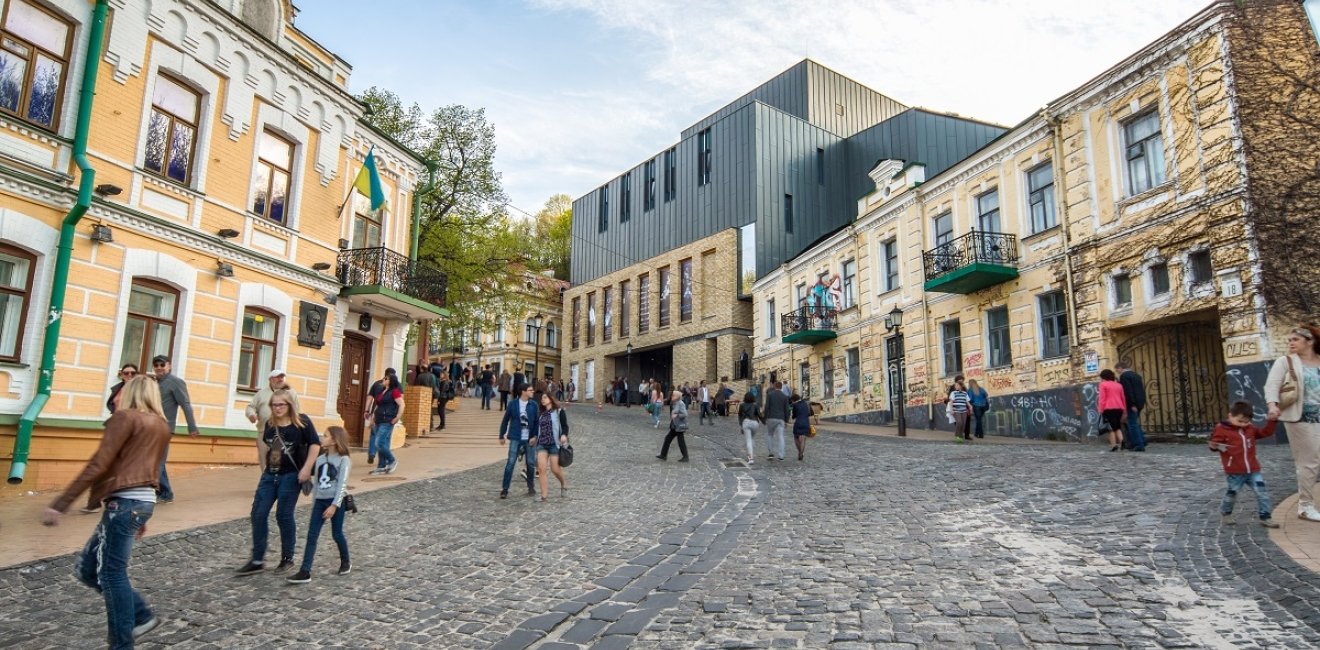
A blog of the Kennan Institute
The 2022 Russian full-scale invasion of Ukraine touched off a creative firestorm in Ukraine’s theater community. Playwrights set out to capture the terrors of confronting war; actors, directors, producers, and established companies collaborated to keep theater companies together as circumstances allowed. Those in theater mobilized to demonstrate the mistakenness of Russian claims that there is no Ukrainian culture.
New plays giving expression to the horrors of war sprang forth. Scores of original works appeared in translation at readings around the world. New Ukrainian works appeared in London, New York, Buenos Aires, and Hong Kong. After some initial minimalist readings, several new works moved into full production.
In Ukraine, theaters reopened their doors as soon as martial law restrictions allowed. Initially, shows tended towards escapist works intended to strengthen morale. Over time, plays explored questions about Ukraine’s new realities. What does it mean to live in a city under attack? Be a refugee? Be a soldier for the first time?
As war, tragically, became normal, some theater companies—often with international funding—began to look back, as well as forward, to discern new lessons in works that were thought to belong to the past. A recent production of Polish playwright Slawomir Mrożek’s 1974 play The Emigrants at Kyiv’s Theater on Podil reveals how applicable its insights are to the lives of Ukrainians in the 2020s.
The experiences portrayed on stage mirrored Mrożek’s own exile. The play shows an odd couple, a displaced intellectual and a relocated manual worker, trapped in a dank basement as an old year turns into a new one. They initially dwell on their differences in economic status and background. Over time—through raucous wit and satire—the two discover that their experiences are more alike than not. Both understand the privations of being poor immigrants as they realize when they acknowledge that both know what canned dog food tastes like, and neither can figure out when the new year arrives, as neither has a wristwatch. The play’s absurdity and familiarity made it a cult classic in the Soviet Union of the Brezhnev era.
Mrożek’s life reflects the upheavals of the Cold War. A young hack writer when coming of age in Stalinist Poland, he later questioned his youthful enthusiasm for the Communist regime. In 1963, he and his wife traveled to Italy, where they defected, and the playwright emerged as a major critic of the Polish regime. Five years later, he moved to France, where he would become a citizen. He returned to Poland in 1996 but left again to live in Nice a dozen years later. He died in France in 2013.
He continued to travel and to write, proclaiming the absurdity of totalitarian regimes through his plays. In 1975, famed director Andrej Wajda produced The Emigrants at Kraków’s venerable Stary Teatr. This and other Mrożek works would come to symbolize the demands of the Solidarity movement in the 1980s.
This staging at the Theater on Podil resonates with the past as well. Noteworthy Ukrainian director Vitaliy Malakhov established Kyiv’s Theater on Podil in 1987 in response to the first wave of political and cultural opening under Mikhail Gorbachev’s perestroika policies. The theater came to rank among the city’s most prestigious companies. Its prominent location in the historic Podil neighborhood and its 2018 reconstruction, which earned the European Mies van der Rohe Award in 2019, added to its luster. Malakhov remained as director until his death in 2021 due to complications from COVID. In 2022, the theater appointed distinguished actor, and former member of the Ukrainian Parliament, Bohdan Beniuk as temporary artistic director for the period of martial law.
The current production of Elena Kataeva’s new Ukrainian translation of The Emigrants has played in repertoire since October 2022. Performed by veteran—and beloved—actors Sergey Boiko and Mykhailo Krishtal, this production appears on the theater’s smaller Igor Slavinsky Stage, which is well suited to the constraints imposed by martial law restrictions on public gatherings. The Emigrants has become a story of contemporary Ukraine. Tens of thousands of Ukrainians now live in emigration facing the trials, heartbreaks, and absurdities that Mrożek’s Poles once did.
The opinions expressed in this article are those solely of the author and do not reflect the views of the Kennan Institute.
Author

Former Wilson Center Vice President for Programs (2014-2017); Director of the Comparative Urban Studies Program/Urban Sustainability Laboratory (1992-2017); Director of the Kennan Institute for Advanced Russian Studies (1989-2012) and Director of the Program on Global Sustainability and Resilience (2012-2014)

Kennan Institute
After more than 50 years as a vital part of the Wilson Center legacy, the Kennan Institute has become an independent think tank. You can find the current website for the Kennan Institute at kennaninstitute.org. Please look for future announcements about partnership activities between the Wilson Center and the Kennan Institute at Wilson Center Press Room. The Kennan Institute is the premier US center for advanced research on Eurasia and the oldest and largest regional program at the Woodrow Wilson International Center for Scholars. The Kennan Institute is committed to improving American understanding of Russia, Ukraine, Central Asia, the South Caucasus, and the surrounding region through research and exchange. Read more

Explore More in Focus Ukraine
Browse Focus Ukraine
Talking to the Dead to Heal the Living

Ukrainian Issue in Polish Elections


